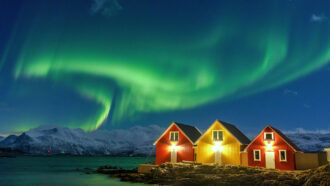Scientists Say
A weekly word defined, in a sentence and in context.
-
 Planets
PlanetsScientists Say: Theia
Clues about this ancient protoplanet's catastrophic end may have been entombed in Earth's lower mantle for billions of years.
-
 Science & Society
Science & SocietyScientists Say: Dialect
Different dialects of the same language have distinct words, pronunciations and sentence structures.
-
 Artificial Intelligence
Artificial IntelligenceScientists Say: Deepfake
Seeing should no longer mean believing, now that AI tech makes creating fake videos, audio and images easier than ever.
-
 Archaeology
ArchaeologyScientists Say: Stone Age
This vast, mysterious stretch of time marks the dawn of human civilizations.
-
 Space
SpaceScientists Say: Campfire
These miniature solar flares could help solve a big mystery about our sun.
-
 Space
SpaceScientists Say: Kugelblitz
A black hole made of pure light —or kugelblitz — may be possible, at least in theory. But in practice: impossible.
-
 Physics
PhysicsScientists Say: Magnetosphere
This magnetic field encapsulates our planet, sheltering us from damaging energetic threats posed by the cosmos and our own sun.
-
 Space
SpaceScientists Say: Cosmic rays
These energy-packed particles come to us from the farthest reaches of outer space.
-
 Genetics
GeneticsScientists Say: Telomere
These protective caps at the ends of chromosomes play a key role in cell replication.
-
 Math
MathScientists Say: Fractal
There’s no end in sight for these infinitely complex geometric wonders.
-
 Materials Science
Materials ScienceScientists Say: Goldene
Making this metallic, two-dimensional (2-D) material is difficult — but super-thin sheets of gold could have uses in electronics and chemistry.
-
 Science & Society
Science & SocietyScientists Say: Thought experiment
Thinking through imaginary, sometimes absurd, scenarios can catalyze new ways of thinking.